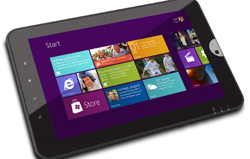 Although the Windows Phone platform unquestionably represented a quantum leap forward in Microsoft mobile technology, underneath its slick interface and app support beats the heart of an outdated OS.
Although the Windows Phone platform unquestionably represented a quantum leap forward in Microsoft mobile technology, underneath its slick interface and app support beats the heart of an outdated OS.While iOS was developed from OS X and Android from Linux, Windows Phone 7 was built from an already dated platform called Windows CE. Starting with an existing mobile OS allowed Microsoft to develop Windows Phone into a finished product very quickly, but a lot of work would have been required to make it suitable for a modern tablet.
Last year Microsoft began detailing their plans for the touchscreen tablet market. While their vision does include Windows Phone's Metro interface, it is built on their next generation desktop OS. Windows 8 is essentially the culmination of work began at least a decade ago to redesign Windows for servers. The goal was to divide the OS into many separate parts which could be selectively installed.
The same changes which make it possible to minimize Windows' footprint on a server also proved useful in optimizing Windows for tablets. Combined with the touchscreen friendly Metro UI and new strategies to keep hardware in an idle state whenever possible, they make it possible for Microsoft to finally create a modern mobile OS.
According to Evan Blass at Pocketnow, that same technology will also be finding its way into Windows Phone 8. He says the information comes from a video Microsoft made for Nokia, their favored Windows Phone partner. Joe Belfiore of the Windows Phone team reportedly lists "kernel, networking stacks, security, and multimedia support" as areas where Windows 8 components will be adopted, or perhaps adapted, in Windows Phone 8.
This certainly seems like a logical move, perhaps the only sensible one, if Microsoft wants to compete with the iOS and Android ecosystems where the distinction between phone and tablet apps is largely non-existent. However, based on Blass' recounting of the Microsoft presentation, it appears there will be a somewhat wider gap between Windows Phone and Windows 8 than between tablets and phones running iOS or Android.
He says Belfiore indicated developers would be able to "reuse -- by far -- most of their code" when porting apps from Windows to Windows Phone. Perhaps that's an indication Windows Phone 8 is on a parallel development track, instead of being based directly on Windows 8. Or maybe it just means some Windows 8 components will be available for tablets, but left out of Windows Phone.
In fact, there would seem to be some merit to the latter approach for Microsoft. Unlike the iPad, which is successful largely because of its similarity with the iPhone, a Windows 8 tablet will likely succeed (or fail) based on how it compares to a Windows desktop. Features which may be essential for a Windows tablet could simply be bloat on a Windows smartphone.

No comments:
Post a Comment